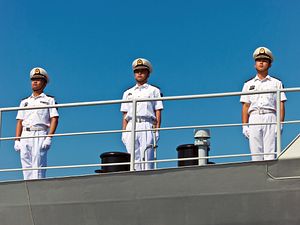A few curated defense and security links from around the web:
Over at The National Interest, our very own Naval Diplomat, James Holmes, assesses China’s chances in a war with America. Holmes frames his analysis using the 1894-1894 Sino-Japanese War, noting that assessing hardware alone will tell us little about the outcome of a potential war:
So to rifle through the pages of Jane’s Fighting Ships, project the victor in a naval clash, and pronounce other possibilities irrational is to rule out human ingenuity, human fallibility, and the vagaries of war. Worse, it rules out politics. Japan only needed a small-scale triumph over imperial China to fulfill its aims in 1894-1895. It saw no need to overthrow the Qing regime, occupy China, or even vanquish the entire Qing navy. Today, likewise, China need not utterly defeat American arms to achieve modest goals. Capability sufficient to Beijing’s purposes may soon fall within the PLA’s grasp. Heck, it may already be within reach.
If you’re interested in Australia’s position in the Asia-Pacific amid a growing strategic rivalry between the U.S. and China, it’s worth reading the debate over at the ASPI Strategist between Hugh White and Peter Jennings on whether and to what degree Australia must choose between the U.S. and China. Jennings rebuts White’s claim that Australia need not necessarily “make a choice between America and China.”
If you missed it, Japan’s 2014 defense white paper is out and it isn’t too nice to China. Our own Clint Richards takes a look at the specifics over at the Tokyo Report, in case you don’t feel like treading through the 505-page report.
Over at RealClearDefense, CSIS PacNet’s David M. Lampton takes a look at the state of U.S.-China relations, arguing that both sides are slowly slipping towards coercive diplomacy. Lampton notes that Asia’s problem is not just Chinese nationalism, but “conflicting, assertive nationalisms” (in the plural) throughout Asia. In this environment, “Washington needs to be careful that in opposing the assertive nationalism of China we are not giving free rein to others.”
Bloomberg has a good overview of the state of the Chinese air force, which is increasingly playing a greater role in China’s military strategy. Both Robert Farley and I looked at the evolving role of air power in China’s Asia-Pacific strategy here on Flashpoints recently.
Finally, over at Foreign Policy, Ritika Katyal takes a look at “Why India’s ‘Blue Water’ Ambitions Matter,” and in the process catalogues India’s broad maritime strategic imperatives. Indeed, for India to become a multilateral maritime leader in the Indian Ocean, its strategic backyard, it will have to field a robust navy.

































